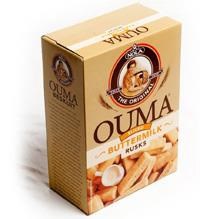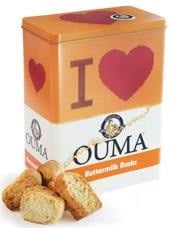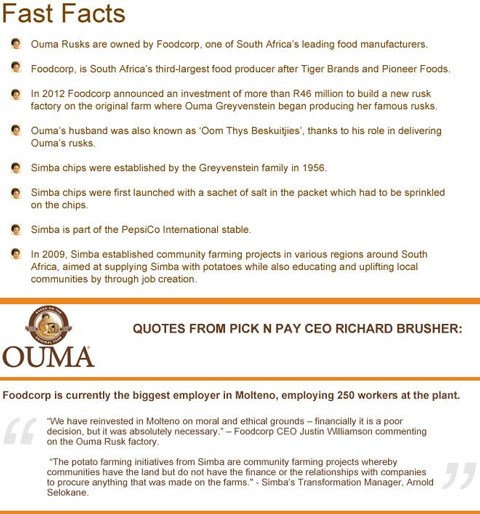Ouma Rusks and Simba chips are two iconic food brands started by the entrepreneurial Greyvenstein family, in the small town of Molteno in the Eastern Cape. Many great ideas are born out of necessity, and the humble beginnings of these South African products that roar with success steeped in tradition are no different. (Video)
The history of Ouma Rusks starts in the 1930s, a time when the world was faced with economic challenges after the Great Depression. In 1939, Ouma 'Nannie' Greyvenstein and her friends attended a local church meeting where ways in which to help mission work were discussed. Their church minister offered each attendee a half-crown (equivalent to about 30 British pennies) and challenged them to reinvest the money using their natural talents.
Ouma Greyvenstein decided to use this money to buy the ingredients to make her revered family-recipe rusks. At the next church bazaar, her first batch of rusks sold out within minutes and orders came pouring in for more. Word soon spread, and the demand for Ouma's rusks continued to grow. Ouma's eldest son, Leon, saw great potential in selling his mother's popular rusks further afield, and set off on a road trip, his Ford 'bakkie' loaded up with rusks, to investigate the possibility of a market up north.
The rusks sold well and he sensed the potential for a good business. Upon his return to the farm, he converted the modest farm barn into a rudimentary rusk factory, using an old car engine for a rusk dryer, and adding a few extra clay ovens. At first the rusks were sold under the name of Uitspan and later Outspan, but as Ouma's rusk empire expanded and grew in popularity across South Africa, it was decided to rename the brand Ouma Rusks, in recognition of their founder, Ouma 'Nannie'.
The business soon needed to expand, and in 1941, the Greyvenstein's barn was converted into a proper factory, financed through a loan from the Industrial Development Corporation (IDC). This was one of the IDC's earliest investments. Disastrously, the factory burnt down in 1952, but a bigger, better factory was built in due course.
And then along came Simba
Having successfully created and marketed Ouma Rusks, by 1955, the family wanted to diversify their business, and they decided to seek out new opportunities. On his travels overseas, Leon Greyvenstein met a man called Herman Lay who was the founder of Lay's potato chips, one of the largest chip manufacturers in the world. The two men struck up a friendship, and Leon travelled to the US where he saw a potato chip factory in action. He brought the process back to South Africa to start producing his own brand of chips, which he called Simba. South Africans were introduced to the Simba 'Chippie' in 1956, and then to Simba the Lion, who, along with the catch phrase "Roarrrs with flavour", would grow into one of the South Africa's most recognised and iconic brands.

The business continued to grow, and other food products and snacks were added to the prosperous Greyvenstein empire, including Taystee Wheat breakfast cereal and roasted peanuts. In the 1970s the business was sold to Fedfood, and in 1994, Ouma Rusks became part of the Nola brand and a range of new flavours, including buttermilk and muesli were introduced. Nola eventually became a division of Foodcorp Ltd (Foodcorp was created in 1992 following the merger between food groups Fedfood and Kanhym).
In 1995, PepsiCo Foods International, the largest savoury snack food producer outside the US, and Foodcorp announced that PepsiCo would invest $55 million in Simba, Foodcorp's salty snacks subsidiary. This agreement established PepsiCo as an equal partner in Simba, and in 1999, PepsiCo upped its stake in Simba, turning it into a wholly owned subsidiary, and a success story in its own right.
Instead of moving the factory...
Back to the Ouma Rusk story, what started as a simple buttermilk bun rusk had grown into a successful family business, and more than 70 years later, Ouma Rusks were still being produced on the Friedenheim farm in Molteno. However, by 2011, the logistical and financial challenges facing Ouma Rusks in Molteno had become a major concern for Foodcorp. Ageing infrastructure, poor water quality, unreliable electricity supply and bad roads, along with rising transport costs, forced them to seriously consider moving the production facility to Randfontein in Gauteng. But Foodcorp CEO Justin Williamson realised that there would be negative socio-economic implications for Molteno if the Ouma Rusks factory was moved.
In 2012, Williamson announced that Foodcorp was investing R46m to build a new factory in Molteno. This project would be the biggest investment ever made in the small town, and would replace the existing facility, which was more than 50 years old. In addition to infrastructure challenges, the complexities of operating in a small town were becoming onerous. "We had 91 power outages in the last financial year alone," Williamson said. "That costs us millions in wasted batches and equipment wear and tear caused by power surges."
In addition to these challenges, the water supplied by the local water authority was of such poor quality the company had to purify its own water. And when it snowed, the absence of road clearing equipment meant that the factory became inaccessible. "The result of all of this was that we under-supplied the market by a wide margin last year," Williamson said.
what grew in Molteno, stays in Molteno
Foodcorp was initially keen to build a new Ouma Rusk factory in Gauteng, as this would translate into annual savings of R6m in transport and associated costs. "Building a factory in Molteno costs us about R7m more than to build it here. And 70% of our rusk market is in Gauteng and north of Gauteng, while the current facility is 800km away," Williamson noted.
However, despite the economic viability of moving the factory to Gauteng, Williamson said the company had made a moral decision to invest in the Eastern Cape facility instead, pointing out that Foodcorp was currently the biggest employer in Molteno, employing 250 workers.
"I could not bring myself to live with what would have been severe consequences for the town of Molteno if we had moved the plant. We have reinvested in Molteno on moral and ethical grounds - financially it is a poor decision, but it was absolutely necessary," Williamson said.
Boost in production
The upgrade will increase the factory's production capacity by 25%, from the current production of 16 tons per day to 23 tons per day. The factory has been geared for further expansion, as well as for the addition of new product lines in a grocery category in due course. "We are looking to expand the Ouma brand into biscuits," Williamson said.
From the humble beginnings of a half-crown venture, Ouma's rusk empire emerged and grew into one of South Africa's most popular food brands. And from a chance meeting between Herman Lay and Ouma's son Leon, South Africans received their own brand of crispy potato chips. No company is successful without hard work and effective management of the business's growth, and these elements are further critical components behind the success story of Ouma Rusks, Simba chips and the Greyvenstein family.
Ouma Rusks:
"Ouma of the week", in conjunction with the SABC3 Expresso show, gives viewers a chance to nominate their grandparents as the best grandparent, and includes a little story about why their grandparent should be grandparent of the week.









































